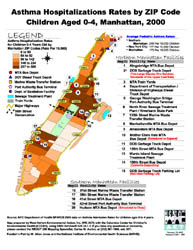Asthma Hospitalization Rates by ZIP Code Children Aged 0-4, Manhattan, 2000

(Click on picture to view as PDF)
Short Description: Polluting facilities in Manhattan and their proximity to ZIP codes with high asthma hospitalization rates for children 0-4 years old in 2000.
Data Details: The basemap polygons are 1990 US Census Zone Improvement Plan (ZIP) Code boundaries. The dataset was obtained from the New York City Department of Health's (NYCDOH) Statewide Planning and Research Cooperative System (SPARCS) data on asthma rates for children ages 0 to 4 years old in 2000. The legend is classified in quantiles. The Department of Transportation (DOT) Truck Depots, Port Authority (PA) Bus Terminals, Metropolitan Transportation Authority (MTA) Bus Depots, Department of Sanitation (DOS) Marine Waste Transfer Stations, Department of Sanitation (DOS) facilities (includes parking lots), Department of Environmental Protection (DEP) Sewage Treatment Plants, and New York City Transit Authority (NYCTA) Train Yards were geocoded by the WE ACT GIS Mapping Specialist. The 96th street demarcation line was generated by the WE ACT GIS Mapping Specialist. The Major Highways were derived from the US Census street shapefiles. Magnetic north is up.
Credits: Map prepared by Carlos M. Jusino at West Harlem Environmental Action, Inc. (WE ACT) with assistance from the Columbia Center for Children's Environmental Health (CCCEH), using ArcView® GIS v3.1.1 software from the Environmental Systems Research Institute, Inc. (ESRI).
Support: Funded in part by the former W. Alton Jones Foundation (now Blue Moon Fund) and by the National Institute of Environmental Health Sciences (NIEHS).
Map Maker’s Notes: ZIP Code identification markers were placed arbitrarily near the areas with the highest rates.
The black dashed line representing the demarcation between Northern Manhattan and Southern Manhattan is a virtual division marked by 96th Street.
A BUS DEPOT is an expanded version of a BUS TERMINAL. A depot contains maintenance equipment that a terminal does not. A terminal is often just a way-point for passengers and a turn-around point for buses.